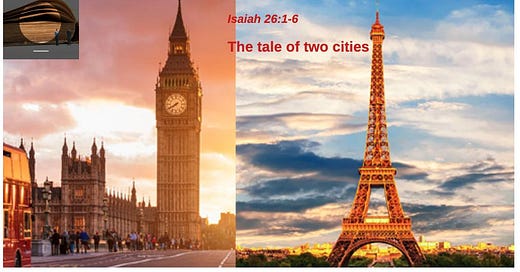In recent years, we have observed a growing tendency of people moving from rural areas to cities. They are being lured to the cities by the promise of a more convenient life. A city offers better education, health care, and work opportunities. Japan and Singapore open the list of the safest and most convenient cities for living while Caracas in Venezuela and San Pedro Sula in Honduras are ranked the most dangerous to live in. In today's fragment of the Book of Isaiah, the prophet speaks about "a mighty city" (Is 26:1) guarded by the Lord (Is 26:1) and "a lofty city" humbled by the Lord (Is 26:5). The first is usually considered to be Jerusalem, the second is understood as a symbol of oppressive nations.
Any attentive reader of the Book of Isaiah will immediately notice the prophet's aversion to anything that sets itself above others, including lofty trees and mountains. We say that pride goes before the fall; the prophet says that God is going to put down all expressions of pride. That is the message of the song to be sung in the land of Judah one day: "A lofty city" is brought down low. The symbolic name given to that city in the Bible is Babylon. It appears for the first time in Genesis 11:1-9, as a rebellious project of human pride that with the help of recent technology wants to build a tower that reaches the heavens. It appears for the last time in the Book of Revelation symbolised by a lustful woman that lured other nations to do business with it (see Rev 17-18).
Rejecting pride, the prophet embraces humility. Looking at the quiet waters of a tiny stream, Isaiah made a comment about trusting the Lord. Proclaiming that the Lord surpasses anything, he immediately adds that the Lord of Israel loves to dwell in the hearts of humble people (see Is 57:15). Looking at the walls and ramparts that surrounded Jerusalem of his time, he saw in them a symbol of God's protection (see Is 26:1). Thus, the "mighty city" from verse 1 is mighty because its people are righteous and trust in the Lord. The Book of Revelation develops this idea further. The holy Jerusalem coming down from heaven is filled with God's glory, those who are written in the Lamb's book of life can live in it, and "nothing unclean will ever enter it, nor anyone who does what is detestable or false" (Rev 21:27).
The tale of two cities was further developed by St. Augustine in his famous theological treatise on the fall of Rome titled "The City of God". Like many Jewish people of Isaiah's time, the Romans could not imagine that their beloved city, Rome, could ever fall into the hands of barbarians. And so, when in 410 AD, the city was sacked by the Visigoths, they blamed Christianity with its abolition of pagan worship and changing of ancient customs for that tragedy. St. Augustine responded that the Romans should blame themselves and their sinful way of life, and not search for scapegoats. In this context, St. Augustine developed an idea of "the city of God" marked by faith and "the city of man" marked by unbelief.
How about our cities? Are they marked by faith or unbelief, by humility or pride, by trust in the Lord or trust in ourselves? The answer to these questions will determine our future.




